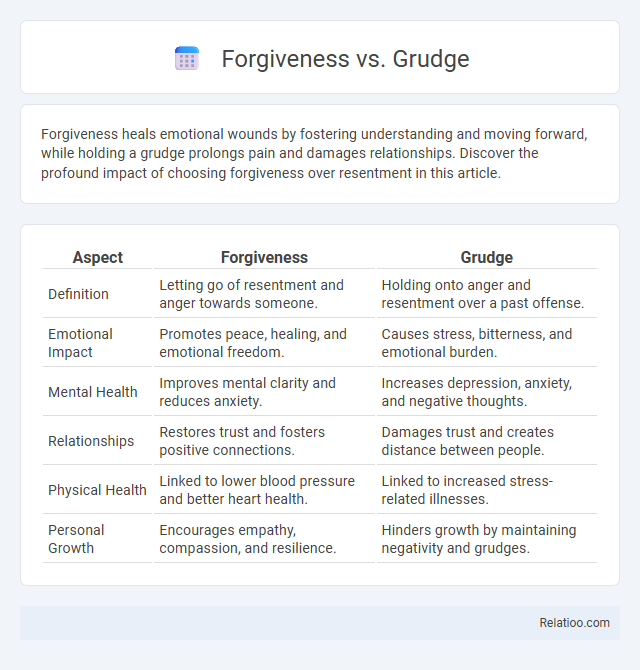Forgiveness heals emotional wounds by fostering understanding and moving forward, while holding a grudge prolongs pain and damages relationships. Discover the profound impact of choosing forgiveness over resentment in this article.
Table of Comparison
| Aspect | Forgiveness | Grudge |
|---|---|---|
| Definition | Letting go of resentment and anger towards someone. | Holding onto anger and resentment over a past offense. |
| Emotional Impact | Promotes peace, healing, and emotional freedom. | Causes stress, bitterness, and emotional burden. |
| Mental Health | Improves mental clarity and reduces anxiety. | Increases depression, anxiety, and negative thoughts. |
| Relationships | Restores trust and fosters positive connections. | Damages trust and creates distance between people. |
| Physical Health | Linked to lower blood pressure and better heart health. | Linked to increased stress-related illnesses. |
| Personal Growth | Encourages empathy, compassion, and resilience. | Hinders growth by maintaining negativity and grudges. |
Understanding Forgiveness and Grudge
Understanding forgiveness involves recognizing its role in releasing resentment and promoting emotional healing, allowing you to move beyond past hurts and foster inner peace. In contrast, holding a grudge maintains negative feelings and prolongs emotional pain, ultimately hindering personal growth and relationships. Differentiating forgiveness from a grudge is crucial for mental well-being and developing healthier interactions with others.
The Psychological Impact of Forgiveness
Forgiveness profoundly benefits your mental health by reducing stress, anxiety, and depressive symptoms often linked to holding grudges. Harboring a grudge triggers chronic negative emotions like anger and resentment, which can increase cortisol levels and impair brain function over time. Embracing forgiveness fosters emotional healing, improves interpersonal relationships, and promotes resilience against psychological distress.
How Holding a Grudge Affects Mental Health
Holding a grudge can lead to chronic stress, increased anxiety, and depression, negatively impacting your mental health over time. This persistent resentment consumes emotional energy and prevents emotional healing, resulting in difficulty concentrating and reduced overall well-being. Forgiveness, on the other hand, promotes psychological relief by releasing bitterness and fostering emotional resilience.
Key Differences Between Forgiveness and Grudges
Forgiveness involves letting go of resentment and offering emotional release, promoting healing and mental well-being, whereas grudges maintain negative feelings that foster ongoing bitterness and stress. Forgiveness is characterized by empathy, understanding, and intentional decision to move forward, while grudges are marked by persistent anger and a desire for retribution. The key difference lies in forgiveness's focus on emotional freedom and reconciliation, contrasting with grudges' reinforcement of mental weight and relational division.
The Role of Empathy in Letting Go
Empathy plays a crucial role in forgiveness by enabling individuals to understand the emotions and perspectives behind actions that caused hurt, facilitating emotional release. Holding a grudge often involves a lack of empathetic insight, which sustains resentment and prolongs relational conflict. Cultivating empathy promotes emotional healing and helps break the cycle of grudges by fostering compassion and acceptance.
Steps to Cultivate Forgiveness
Cultivating forgiveness involves acknowledging the pain caused by a grudge and consciously choosing to release negative emotions tied to the offense. Key steps include recognizing the impact of holding a grudge on mental and physical health, practicing empathy toward the offender, and engaging in reflective exercises such as journaling or meditation to foster emotional healing. Consistent efforts to shift focus from resentment to compassion help rebuild relationships and promote inner peace.
Common Reasons People Hold Grudges
People often hold grudges due to experiences of betrayal, perceived injustice, or unresolved conflicts that evoke deep emotional pain. Lingering resentment is fueled by feelings of hurt, anger, or fear, which inhibit the ability to forgive and move forward. Understanding these core reasons helps in addressing the root causes of grudges and promotes emotional healing.
The Emotional Benefits of Forgiveness
Forgiveness releases the emotional burden of resentment, promoting inner peace and healthier relationships by allowing you to let go of past hurts. Holding a grudge keeps negative emotions like anger and bitterness active, which can increase stress and impact mental well-being. Choosing forgiveness over grudge fosters emotional healing, reduces anxiety, and enhances overall psychological resilience.
Strategies to Release Long-Held Grudges
Releasing long-held grudges requires intentional strategies such as practicing empathy to understand the other person's perspective and engaging in mindfulness techniques to manage emotional triggers effectively. You can also benefit from journaling your feelings to gain clarity and gradually shift your mindset toward forgiveness, which promotes emotional healing and reduces stress. Cultivating compassion, setting healthy boundaries, and seeking professional support like therapy enhance your ability to let go of resentment and improve overall well-being.
Building a Forgiving Mindset for Personal Growth
Forgiveness involves consciously releasing resentment and anger, which fosters emotional healing and personal growth by reducing stress and promoting mental clarity. Holding a grudge maintains negative emotions that hinder self-development and create psychological barriers. Building a forgiving mindset encourages empathy, resilience, and improved relationships, key components for sustained personal transformation and well-being.

Infographic: Forgiveness vs Grudge
 relatioo.com
relatioo.com